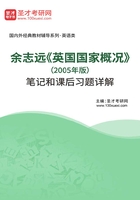
5.2 课后习题详解
1. What were the Parliamentary politics like in the late 18th and early 19th centuries?
Key: In the late 18th and early 19th centuries Radicals were active in Parliament spreading radical ideas. Their one common aim was thorough reform of the Parliamentary system. They were greatly influenced by Jeremy Bentham’s ideals known as “Utilitarianism”.
2. What is your comment on land enclosures in England?
Key: Agricultural enclosure had good as well as bad results. (1) Farms became bigger and bigger units; (2) more vegetables, milk and dairy produce were consumed, and diet became more varied; (3) enclosure was a disaster for the tenants evicted from their lands by the enclosures. (4) A new class hostility was introduced into rural relationships.
3. What was the industrial revolution? Why was Britain the first country to start the industrial revolution?
Key: The Industrial Revolution refers to the mechanization of industry and the consequent changes in social and economic organization in Britain in the late 18th and early 19th centuries.
Britain was the first country to industrialize because of the following factors: (1) Britain had a peaceful society, which, after the 17th century, was increasingly interested in overseas trade and colonies. (2) The limited monarchy ensured that the powerful economic interests in the community could exert their influence over Government policy. (3) The enclosures provided food for the rising population, labor for the factories, and some of the raw materials needed by industry.
4. How did the English Industrial Revolution proceed?
Key: Changes occurred earliest and quickest in textiles, especially cotton and silk. Spinning was revolutionized by James Hargreaves’ spinning jenny (1766). In 1765, James Watt (1736—1819) produced a very efficient steam engine. Abraham Darby succeeded in smelting iron with coke in 1709. This hugely increased the production of iron. By the early 19th century, Britain had a road network of some 125, 000 miles (200, 000 km).
5. What do you know about parliamentary reforms?
Key: Parliamentary reform was necessary for several reasons. (1)Power was monopolized by the aristocrats. (2) Representation of town and country, and North and South was unfair. (3) There were also various so-called rotten or pocket boroughs.
Between 1832 and 1884 three Reform Bills were passed. The Reform Act of 1832 abolished “rotten boroughs”. Then the New Poor Law of 1834 forced the poor people into workhouses. There was widespread dissatisfaction with the Reform Act of 1832 and the New Poor Law. In 1836, the Chartist movement broke out.
6. What do you know about the Chartist Movement and the People’s Charter? What is your comment on them?
Key: In 1836, a group of workers formed the London Working Men’s Association and the Chartist movement broke out. A People’s Charter was drawn up in 1838. It had six points: (1) the vote for all adult males, (2) voting by secret ballot, (3) equal electoral districts, (4) abolition of property qualifications for members of Parliament, (5) payment of members of Parliament, and (6) annual Parliaments, with a General Election every June.
The Chartists could be divided into two groups: the Moral Force Chartists and the Physical Force Chartists. Chartism failed but the Chartist movement was the first nationwide working class movement and drew attention to serious problems.
7. How did the Labor Party come into being?
Key: In 1900, representatives of trade unions, the Independent Labor Party and other socialist societies set up the Labor Representation Committee (LRC). The LRC changed its name to the Labor Party in 1906.
8. What was the colonial expansion like during the 19th century?
Key: ①In the late 18th century Britain acquired vast territories: Canada, Australia, and New Zealand. ②In 1857 the native troops of the Bengal army mutinied. Then the control of India passed to the British Crown in 1858. ③The British colonialists launched a war of aggression against China in 1840. A second war was from 1856 to 1858. ④By 1900 Britain had built up a big empire, “on which the sun never set”. It included 25% of the world’s population and area.
9. What role did Winston Churchill play in the Second World War?
Key: Winston Churchill took over as Prime Minister in 1940. He received massive popular support as a war leader and led his country to final victory in 1945.
10. What are the main contents of Thatcherism?
Key: Margaret Thatcher’s policies are referred to as Thatcherism. It included the return to private ownership of state-owned industries, the use of monetarist policies to control inflation, the weakening of trade unions, the strengthening of the role of market forces in the economy, and an emphasis on law and order.